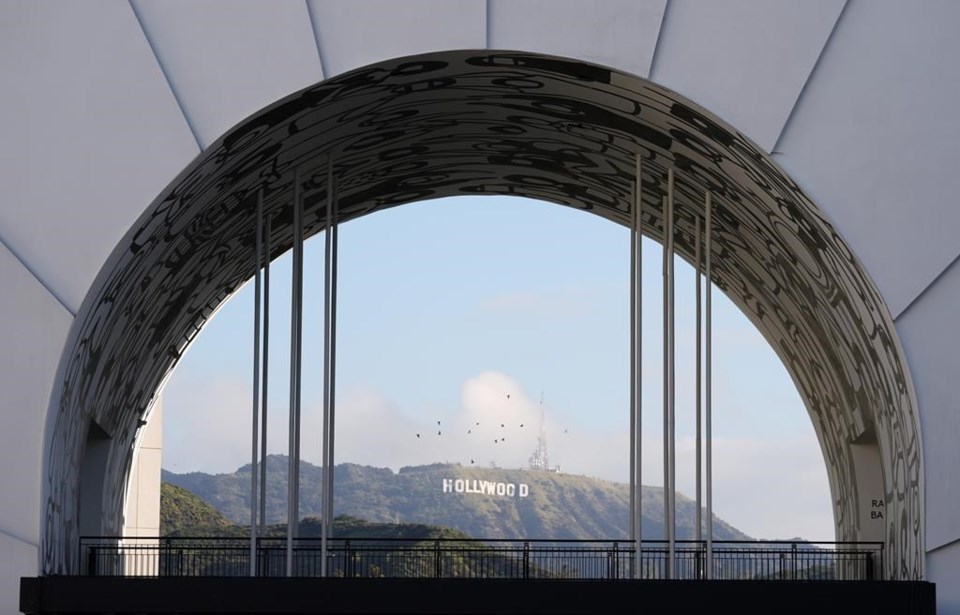NEW YORK (AP) ā The are poised to do something on Sunday that they havenāt done in a very long time: Hand its top award to a blockbuster.
After years of favoring smaller movies like and ā the clear best-picture favorite āOppenheimerā ā with ā is steam rolling toward the kind of big-movie dominance the Academy Awards hasnāt seen in two decades.
You have to go back to (2012) to find a best-picture winner thatās grossed more than $100 million domestically. Academy votersā tastes have instead largely favored smaller independently produced films like āNomadlandā and an Apple release with zero reported box office in North America. Last year, the scrappy, distinctly un-Oscar-like indie played the role of awards-season underdog until it became
But even āArgo,ā which walked away with three Oscars after grossing $232.3 million worldwide on a $44.5 million budget, isnāt much of a corollary to āOppenheimer.ā For that, you need to rewind to the 2004 Oscars, where Peter Jacksonās āThe Lord of the Rings: Return of the Kingā ā a $1.16 billion smash ā took home 11 Oscars. Thatās more the kind of wall-to-wall sweep expected Sunday for
Itās a reversal all the more striking because the 20 years since āReturn of the Kingā have belonged, overwhelmingly, to the blockbuster. Itās a period thatās included āAvatar,ā āBlack Panther,ā āTop Gun: Maverick,ā āThe Dark Knightā and the entire run of the Marvel Cinematic Universe. Itās a film culture shift that not everyone in Hollywood ā including, most famously, ā has loved. That's surely been a factor in Oscar voters embracing less traditional choices in recent years, like the 2020 best-picture champ āParasite,ā
For years, big has been bad at the Academy Awards ā a trend the film academy has watched unfold with sporadic panic. After Nolanās āThe Dark Knightā failed to be nominated for best picture in 2009, the academy expanded the best-picture category beyond five films. (Itās now 10.) In 2018, the academy but within weeks that was nixed when Oscar voters rebelled against it.
Such schisms are as old as the Oscars. The first Academy Awards, in 1929, split its top award in two: Outstanding Picture (which went to William Wellmanās dazzling WWI fighter plane action film āWingsā) and Best Unique and Artistic Picture (which went to F. W. Murnauās silent masterpiece āSunriseā).
When more widely seen movies are in contention at the Oscars, more people have historically tuned in. The most-watched Academy Awards ever was when āTitanicā ruled the 1998 Oscars, winning 11 trophies. Some 57.3 million viewers watched James Cameron declare āIām the king of the world!ā
This year, there are not one but two billion-dollar blockbusters in the Oscar mix, in āOppenheimerā and āBarbie,ā raising hopes for a telecast that has in recent years hovered closer to a third of the āTitanicā-year viewership. Last yearās ceremony was watched by
āIt makes it 10 times easier,ā . āWhen nobody has seen the movies ā and that has happened, including years when Iāve hosted ā you have no point of reference to go from.ā
It can sometimes be overstated how much having a blockbuster to root for impacts Oscar ratings. The more significant factors tend to be long-term ones, like the decline of linear television and the overall splintering of pop culture. Year-to-year fluctuations are usually less drastic. Nearly as many tuned in to see Clint Eastwood's āMillion Dollar Babyā win best picture in 2005 (42.1 million) as they did the year prior for āReturn of the Kingā (43.5 million).
though, was a rare phenomenon, and one the Oscars ā which lavished was eager to embrace. Thatās especially because the success of the two films stood in such stark contrast to what the majority in the film industry is currently experiencing.
Both films launched just as actors walked out in in a protracted battle over streaming, artificial intelligence and the future of the business. Labor strife isnāt over, either; this week, craft workers with IATSE and Teamsters Local 399 began negotiations with studios, talks that much of the industry will be closely watching even as it celebrates at the Oscars.
More than that, that many fear is increasingly obsolete in a Hollywood thatās struggling to find its way forward amid . Streaming revenues have lagged for . Production delays brought on by the strike has led to The sheer, spectacular accomplishment of āOppenheimerā ā a talky three-hour drama that outperformed āAnt-Manā and āAquaman," combined ā is a bright, shining exception.
āIt certainly confirms our faith in what studio filmmaking can be,ā
The Oscars are always where Hollywood celebrates an idea of itself. Last year, Hollywood told itself with āEverything Everywhere All at Onceā that, yes, it could still be boldly original. When āParasiteā triumphed, it was a chest-thump for Hollywoodās expanding internationalism.
This year, Hollywood will hang its hat on an old-fashioned kind of winner ā a studio epic ā full of awe for whatās possible and dread for what may be to come.
___
Follow AP Film Writer Jake Coyle at:
Jake Coyle, The Associated Press




